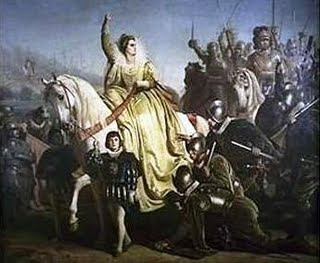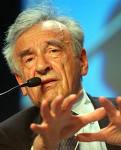Persuasive Speech Sample
Use a persuasive speech sample as a quick way to learn.
These two famous speeches are great examples of the critical parts of a speech - opening and closing. Theory and principles are important, but nothing beats seeing and hearing the real thing in action.
After you read each of the extracts from each famous speech, you'll see some lessons. These are some of the key pointers you can use to be more persuasive in your next speech.
Enjoy learning from these great persuasive speech samples.

Persuasive Speech Sample 1 - Queen Elizabeth I
The scene for this persuasive speech sample is the year 1588. The island nation of England is facing a terrifying enemy. A huge invasion fleet, known as the Spanish Armada, has sailed to invade and conquer England in the name of the Pope and Spain.
The 55 year old Queen has riden to Tilbury, near London, to rally the troops to fight back. The stakes could hardly be any higher.
Here's how she begins.
| "My loving people.
We have been persuaded by some that are careful of our safety, to take heed how we commit ourselves to armed multitudes, for fear of treachery, but I assure you I do not desire to live to distrust my faithful and loving people.
Let tyrants fear. I have always so behaved myself that, under God, I have placed my chiefest strength and safeguard in the loyal hearts and good-will of my subjects.
And therefore I am come amongst you, as you see, at this time, not for my recreation or disport, but being resolved, in the midst and heat of the battle, to live and die amongst you all. To lay down for my God, and for my Kingdom, and my people, my honor and my blood, even in the dust.
I know I have the body but of a weak and feeble woman; but I have the heart and stomach of a King, and a King of England too."
|
No wonder she reigned for 45 years! What a brilliant opening to a persuasive speech.
Lessons
It's amazing what she achieves with 163 words in this persuasive speech sample.
- Ethos. She got them not just to like her, but to love her. She does it by nailing Aristotle's 3 methods of showing her Virtue, Practical Wisdom and Disinterest.
- Virtue. She lived up to her audience's values by being exactly what they expected her to be. A brave Queen, willing to die with them.
She further identifies with them, by creating a common enemy of the troops and her - "We have been persuaded by some ..." - the cowardly, cautious 'some' who would have kept her from her beloved troops. Scumbags!
- Practical Wisdom. She brilliantly shows her street smarts by demonstrating how rules were made to be broken. The rules were 'keep out of harm's way Your Majesty'. By her very presence on the battlefield, and by what she says in the first sentence after her greeting, she shows the troops what she thinks of that.
- Disinterest. Also known as selflessness. She nails that one in the first sentence too, by effectively saying 'I'd rather die than not trust you.' You can feel the tears welling up in the eyes of the men.
Then she drives the point home by telling them she's with them all the way, not for a bit of sport and despite her physical frailties which put her at risk.
- Trust. They say the best way to get something is to give it. See how she gets their trust by giving hers first. No questions, kill me if you like, but I trust you. Brilliant!
Remember the most important persuasive tool you have is your Ethos, or character. Use it to open your speeches.
You can read more on
how to use ethics in public speaking here.

Persuasive Speech Sample 2 - Elie Wiesel - The Perils Of Indifference
Elie Wiesel is a Jewish writer and Nobel Peace Prize winner.
This sample is the conclusion of a speech given at the White House on 12 April 1999.
His speech persuades us that the concept of 'indifference' lies at the root of the evils mankind inflicted on itself in the 20th Century.
It must have been very challenging for the Americam audience to hear. He recalls several examples during WWII when indifference among US leadership led directly to the murder of thousands of Jews by the Nazis.
You need serious Ethos to pull that off!
Then he concludes by talking about the US and Nato intervention in Kosovo to stop the murderous ethnic cleansing there. He then concludes his speech by asking the audience ...
| Does it mean that we have learned from the past? Does it mean that society has changed?
Has the human being become less indifferent and more human? Have we really learned from
our experiences? Are we less insensitive to the plight of victims of ethnic cleansing and other forms of injustices in places near and far? Is today's justified intervention in Kosovo, led by you, Mr. President, a lasting warning that never again will the deportation, the terrorization of children and their parents, be allowed anywhere in the world? Will it discourage other
dictators in other lands to do the same?
What about the children? Oh, we see them on television, we read about them in the papers, and we do so with a broken heart. Their fate is always the most tragic, inevitably. When
adults wage war, children perish. We see their faces, their eyes. Do we hear their pleas? Do
we feel their pain, their agony? Every minute one of them dies of disease, violence, famine.
Some of them so many of them could be saved.
And so, once again, I think of the young Jewish boy from the Carpathian Mountains. He has accompanied the old man I have become throughout these years of quest and struggle. And
together we walk towards the new millennium, carried by profound fear and extraordinary hope. |
Lessons
In this persuasive speech sample he has to close a very provocative, powerful speech in a way which will move his audience to think differently.
- Pathos. This is the tool that Aristotle suggested all speakers should use to end a persuasive speech. It rouses the emotions in a way the speaker wants.
- Pathos. Wiesel uses plenty but in an entirely appropriate way. He wants an emotional commitment from the audience to his goal of making us forever enemies of human indifference.
- Pathos. He uses questions brilliantly here to support the Logos of his argument. Questions like this make us go inwards and think about how we feel.
- Pathos. He vividly plants an experience in our heads by telling the stories of the children.
- Pathos. He paints a picture of two possible futures brilliantly with his closing remarks. He reminds us that he sees both fear and hope in the future.
If you enjoyed learning from these persuasive speech samples you can learn more about how other great speakers have done their
speech conclusion here.
Learn three different ways to build a
public speaking outline here.
Return from Persuasive Speech Sample to Persuasive Speech
Return from Persuasive Speech Sample to the Fear Of Public Speaking Home Page







